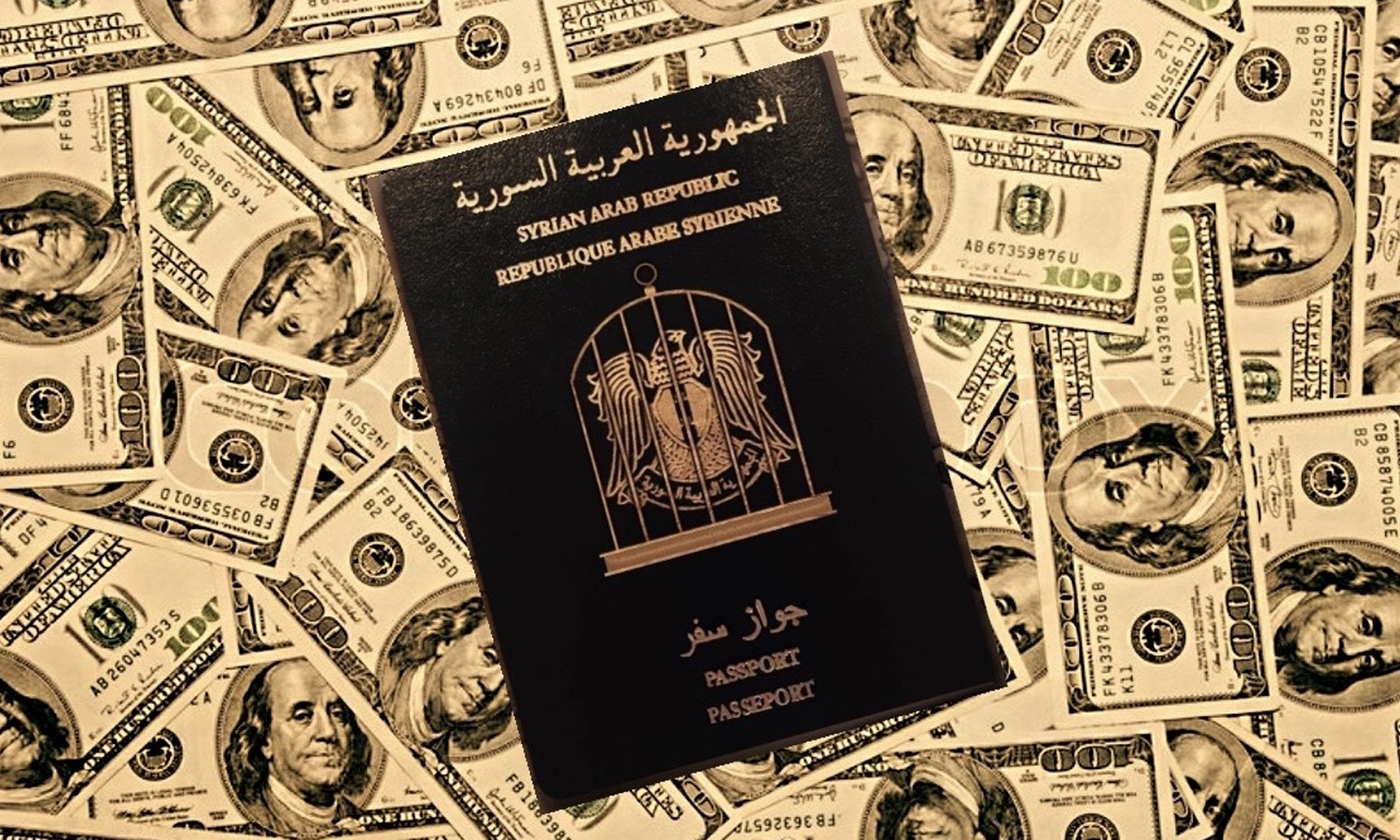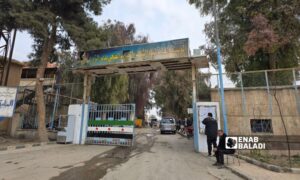
Syrian passport closes doors of commercial transactions for its holders

Enab Baladi – Lujain Mourad
The negative impact of Western sanctions on the Syrian regime and businessmen close to it is reflected on Syrian traders and investors in and outside the country; their passports have turned into a reason for excluding them from business transactions.
Binance, the cryptocurrency trading giant, began closing the accounts of Syrian traders late last April, sparking anger among Syrians who considered the decision “unjust.”
Despite the absence of an official announcement, the said platform shut down the accounts of Syrians who inquired about the issue, while the accounts of those the platform did not recognize as Syrians have remained operational.
According to what Enab Baladi has monitored, restrictions on Syrians are not limited to commercial transactions in relation to digital currencies. Rather, Syrians are subjected to pressures when it comes to banking transactions, even with regard to their personal accounts in various countries of the world.
Collective punishment
The regime is careless; the “innocent” are the victims
Restrictions imposed on Syrians show that the international community has adopted a policy of collective punishment to bear down heavily upon the Syrian regime in punishment for its war crimes since the protests began in 2011. At the same time, the regime insists on showing its indifference by showing off its ability to circumvent economic sanctions.
Syrian professor of economics, Karam Shaar, said in an interview with Enab Baladi that the regime constantly brags about its ability to circumvent sanctions while deeming it a “legitimate coping mechanism.” Meanwhile, the European Union and the US have not sought to reveal the true identities of people who have circumvented the sanctions.
Shaar, who is the research director of the Operations and Policy Center (OPC), explained that the Biden administration is not interested in sanctions against the Syrian regime, seeing that sanctions imposed since Biden came to power were limited to only a few people. In contrast, sanctions had been imposed on opposition figures, and the European Union had not acted to apply greater pressure on the regime.
A policy that is facile to apply
According to Shaar, Western countries consider their policy of restricting the operations of banks and financial institutions in Syria with comprehensive sanctions capable of making financial transactions more difficult for all, including the innocent.
|
It is cheaper to ban all Syrians from the financial system than to audit individual transactions. This is the true meaning of self-centered collective punishment. Syrian Professor in Economics, Karam Shaar |
Although sanctions appear to be “ostensibly” clear with regard to the type of persons targeted, many financial institutions in various countries have opted to cut off their financial dealings with all Syrians and to restrict the services provided to them for fear of violating the sanctions, according to the economic researcher at the Omran Center for Strategic Studies, Mohammad al-Abdallah.
Al-Abdallah noted the heightened fears of financial institutions about the increasing likelihood of money-laundering in countries of conflict, of which Syria is the most prominent.
Sanctions missing the target
Although the primary target of the sanctions was the Syrian regime and businessmen or entities close to it, many indicators show that said sanctions have hit the wrong target, resulting in significant economic damage for Syrians.
“At a time when millions of Syrians inside and outside the country are seeking to withstand the conflict and its economic repercussions, the curtailment imposed by sanctions has limited Syrian access to financial and banking services to enhance their economic resilience,” said researcher Mohammad al-Abdallah.
Al-Abdallah added that “financial restrictions on Syrians have extended to internal and external remittances through official and unofficial financial channels, such as the PayPal platform, which limited Syrians’ ability to conduct remittance transactions. Syrians have also been subjected to restrictions within international financial platforms such as stock and bond markets, and digital currency platforms”.
One of the users of the Binance platform, Anas al-Olabi, 24, told Enab Baladi via a phone call from his place of residence in the Austrian capital that he was looking for another source of income that would not entirely consume his time and effort. This prompted him to start trading or investing in cryptocurrencies using the Binance platform, considering that it is the most well-known, powerful, and secure platform in the field.
About a week after reaching out to the platform’s support department immediately after news was received of the closing of Syrians’ accounts, the platform applied its decision to his account despite having an Austrian travel document, which the platform’s support department considered unable to limit the impact of the “strict” laws regarding the accounts of Syrian citizenship holders, according to the young man.
The young man considered the decision of the platform, or any similar decisions concerning Syrians with no connection to the regime for that matter, to be “unjust.” The largest proportion of those affected by these decisions are people who are trying in various ways to sever all ties that can bind them to the regime, including their passport, which deprived them of many opportunities that could have secured a better life for them.
Syrians inside and outside the country are experiencing significant commercial and economic pressures. According to Shaar, many Syrians residing in Malaysia, for example, are given warnings regarding the closure of their bank accounts, particularly those with modest savings.
Syrians residing in certain European countries, Turkey, and many Arab countries are also experiencing similar pressures regarding their bank accounts.
Shaar believes that “people who are the most powerful and close to the regime are the best able to bypass sanctions, while the public is helpless and most affected by these sanctions.”
|
Syrians’ inability to benefit from external financial services in certain countries has clearly affected their economic stability linked to the ability to activate their commercial, saving, and investment activities in Syria. This could be interpreted as part of a plan to ensure that Syrians are not financially stable in countries of asylum. That plan fulfills the authorities’ desire to repatriate Syrian refugees. Mohammad al-Abdallah, economic researcher at the Omran Center for Strategic Studies. |
Curtailment that affects organizations as well
Sanctions did not only have an impact on Syrians. Rather, said sanctions also had an impact on civil society organizations in and outside Syria.
The impact of the sanctions on the organizations was evident despite the announcement by the US Treasury Department in 2021 to lift sanctions previously imposed on NGOs in Syria.
As monitored by Enab Baladi, many countries, most notably Turkey and the Gulf States, are pursuing the accounts of the organizations or their owners, which further complicate transactions and remittances.
Many charities in France are also unable to open bank accounts, according to Professor Karam Shaar, who noted the significant economic impact that the Syrian passport has had on the lives of its holders.
Non-Syrian affected parties
Many Syrians went to invest in various fields in their areas of asylum, including in cryptocurrency, which some saw as an opportunity to secure a better life for them which would compensate for their losses during the conflict in Syria. Some of them have invested enormous amounts that would bring great benefits to host countries and financial institutions.
According to Shaar, the curtailment imposed on Syrians results in a significant loss for those pressured by the US Treasury Department to tighten their dealings with Syrians. Many sectors in and outside Syria wish to continue to deal with Syrians.
Many countries have preferred to restrict the financial freedom of Syrian investors, capital owners, and clients of banks and financial institutions over the economic gains and benefits that countries or financial institutions can draw from these investments. According to researcher Mohammad al-Abdallah, this was driven by the importance of the reputation of the financial and banking sector at the international level to the state, the fear of a low rating for its financial transparency, and in fear of accusations of supporting and financing terrorism and supporting extremist military groups.
if you think the article contain wrong information or you have additional details Send Correction
النسخة العربية من المقال
-
Follow us :
Most viewed
- 311 casualties among government forces and civilians in Syrian coast
- Al-Sharaa and Abdi reach agreement on merger of SDF into Syrian state
- Syrian Defense Ministry appoints "Abu Amsha" as Hama Brigade commander
- Did Syrian state fall into coastal ambush?
- Rights organization documents government and civilian deaths in Syrian coast

















 A
A
A
A
A
A








 More Economic Reports
More Economic Reports